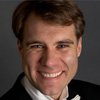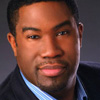skip to main |
skip to sidebar
Stop me if you have heard me say this before, but Jane Glover is the finest conductor on the musical scene today. In my youth I sang under Stokowski, Metropolis, Shaw, Elaine Brown, the lot. She is right up there with the greats.
 Tonight she led Music of the Baroque in Handel's Judas Maccabaeus. The soloists were Yulia Van Doren, soprano, Meg Bragle, mezzo-soprano, Thomas Cooley, tenor, and Eric Owens, bass.
Tonight she led Music of the Baroque in Handel's Judas Maccabaeus. The soloists were Yulia Van Doren, soprano, Meg Bragle, mezzo-soprano, Thomas Cooley, tenor, and Eric Owens, bass.
 Meg Bragle
Meg Bragle
 Thomas Cooley
Of the four I liked Ms. Bragle and Mr. Cooley the best. She sang with a lovely legato line and executed the runs easily and musically. He also sang well but had to resort to falsetto for the high 'A's in 'Sound an alarm.
Years ago I was doing an adjudication at Syracuse University when a young tenor did exactly the same thing. He spoke to me afterwards and I told him' 'Never schedule an aria for an audition unless you own all the notes.' Falsetto high 'A's in that piece just sound like you are wimping out. His runs were very well sung and the rest of his singing was excellent.
Thomas Cooley
Of the four I liked Ms. Bragle and Mr. Cooley the best. She sang with a lovely legato line and executed the runs easily and musically. He also sang well but had to resort to falsetto for the high 'A's in 'Sound an alarm.
Years ago I was doing an adjudication at Syracuse University when a young tenor did exactly the same thing. He spoke to me afterwards and I told him' 'Never schedule an aria for an audition unless you own all the notes.' Falsetto high 'A's in that piece just sound like you are wimping out. His runs were very well sung and the rest of his singing was excellent.
 Yulia Van Doren
Yulia Van Doren  Eric Owens
I have heard both Ms. Van Doren and Mr. Owens previously. Her voice seems to have grown since the last time I heard her. She still does chirpy things on high notes, but she has improved. I heard him in Otello at Glimmerglass this summer. That is obvious a better role for him. Tonight his voice sounded very covered and his runs were almost indecipherable.
The chorus and orchestra, as always, were wonderful. They performed with clarity and energy.
Both soloists and chorus could use a session with Madeleine Marshall's Singer's Guide to English Diction. Final consonants were seldom sung,especially the voiceless ones. I tried just listening through Part 1, without looking at the text, to no avail. By Part 2 I had to get out the specs and follow the words in the program.
Eric Owens
I have heard both Ms. Van Doren and Mr. Owens previously. Her voice seems to have grown since the last time I heard her. She still does chirpy things on high notes, but she has improved. I heard him in Otello at Glimmerglass this summer. That is obvious a better role for him. Tonight his voice sounded very covered and his runs were almost indecipherable.
The chorus and orchestra, as always, were wonderful. They performed with clarity and energy.
Both soloists and chorus could use a session with Madeleine Marshall's Singer's Guide to English Diction. Final consonants were seldom sung,especially the voiceless ones. I tried just listening through Part 1, without looking at the text, to no avail. By Part 2 I had to get out the specs and follow the words in the program.
I would much rather just watch Jane Glover conduct, which I really mostly did anyway. Watching her supple, musical gestures, you hardly needed to hear the music. Somehow, she is the music!
David and I have just returned from a fabulous weekend at Glimmerglass Opera. Candide and MacBeth were the double feature and both were excellent.
Friday night was Bernstein's wonderful score for Candide. It was perfectly conducted and sung by Maestro Joseph Colaneri, Andrew Stenson (Candide) and Kathryn Lewek (Cunegonda).
 Andrew Stenson
Mr. Stenson has a high, free tenor voice and diction that must make Madeleine Marshall smile up in Heaven. He is also a fine actor.
Andrew Stenson
Mr. Stenson has a high, free tenor voice and diction that must make Madeleine Marshall smile up in Heaven. He is also a fine actor.
 Kathryn Lewek
Equally fine was Ms. Lewek as Cunegonda. High notes (and I DO mean high) are no challenge for her and she played the role beautifully.
Less successful was David Garrison as Dr. Pangloss. He is a fine actor and represented the character very well, but the part is just written too low for his singing voice. He sort of disappeared whenever he had to sang.
Also less than ideal was The Old Lady of Marietta Simpson. Again, a fine actress, but she pushes the chest voice so hard that when she has to go up it is to a thin, immature sound that is out of character.
The other members of the cast were excellent, especially Christian Bowers as Maximilian, Matthew Scottin as Martin, and Andrew Marks Maughan as Cacambo.
I missed the first Broadway production of this in 1956 but saw the 1979 version. In the meantime numerous changes to both music and text had been made. Changes were to continue into the 1990's. The original book by Lillian Hellman was finally scratched and Bernstein included music that had been deleted from earlier productions.
Whatever- Friday night's production was a delight and both Ms. Lewek and Mr. Stenson should be having much larger careers in the future.
I am amazed at the quality of singing and acting from the Glimmerglass Young Artist program. Bravi!
Kathryn Lewek
Equally fine was Ms. Lewek as Cunegonda. High notes (and I DO mean high) are no challenge for her and she played the role beautifully.
Less successful was David Garrison as Dr. Pangloss. He is a fine actor and represented the character very well, but the part is just written too low for his singing voice. He sort of disappeared whenever he had to sang.
Also less than ideal was The Old Lady of Marietta Simpson. Again, a fine actress, but she pushes the chest voice so hard that when she has to go up it is to a thin, immature sound that is out of character.
The other members of the cast were excellent, especially Christian Bowers as Maximilian, Matthew Scottin as Martin, and Andrew Marks Maughan as Cacambo.
I missed the first Broadway production of this in 1956 but saw the 1979 version. In the meantime numerous changes to both music and text had been made. Changes were to continue into the 1990's. The original book by Lillian Hellman was finally scratched and Bernstein included music that had been deleted from earlier productions.
Whatever- Friday night's production was a delight and both Ms. Lewek and Mr. Stenson should be having much larger careers in the future.
I am amazed at the quality of singing and acting from the Glimmerglass Young Artist program. Bravi!
 Eric Owens
Saturday night we saw a fine performance of Verdi's MacBeth. Eric Owens was magnificent in the title role. We had seen him at Lyric Opera in Chicago and knew what to expect.
Eric Owens
Saturday night we saw a fine performance of Verdi's MacBeth. Eric Owens was magnificent in the title role. We had seen him at Lyric Opera in Chicago and knew what to expect.
 Melody Moore
Melody Moore blew us away as Lady MacBeth. What a wonderful singer! It seemed that every aria she sang got an ovation- deservedly. Her sleep-walking scene, sung largely pianissimo was spell-binding. She has absolute control of her voice, making whatever she sings sound effortless.
Melody Moore
Melody Moore blew us away as Lady MacBeth. What a wonderful singer! It seemed that every aria she sang got an ovation- deservedly. Her sleep-walking scene, sung largely pianissimo was spell-binding. She has absolute control of her voice, making whatever she sings sound effortless.
Again the other roles, sung by Young Artists, were very well sung and acted, especially Soloman Howard, Michael Brandenburg, Marco D. Cammarota, and Derrel Acon.
Again Joseph Colaneri was the fine conductor.
A wonderful weekend of wonderful singing. Congratulations Glimmerglass. Long may you Glimmer!
Well- I can tell you one thing for sure:Eric Owens has one hell of a bass voice! And I mean that in the most complimentary way. Tonight at the Chicago Lyric Opera's performance of Gershwin's Porgy and Bess, he made William Warfield look like a piker.
 Eric Owens
I heard Warfield, along with Leontyne Price and Cab Callaway in the 1953 revival of the opera in New York City way back when. That's a hard act to follow.
His strong, clear voice, along with excellent diction, and strong dramatic presence, made his performance one I will long remember.
The rest of the cast was very strong both vocally and dramatically. Bess, sung by Adina Aaron, was sung with beautiful tone but poor diction. She seemed bent on coloring vowels in a way that kept you wondering what word she was trying to say.But the sound was lovely and she is a good actress. No Leontyne Price, but then, who is?
Eric Owens
I heard Warfield, along with Leontyne Price and Cab Callaway in the 1953 revival of the opera in New York City way back when. That's a hard act to follow.
His strong, clear voice, along with excellent diction, and strong dramatic presence, made his performance one I will long remember.
The rest of the cast was very strong both vocally and dramatically. Bess, sung by Adina Aaron, was sung with beautiful tone but poor diction. She seemed bent on coloring vowels in a way that kept you wondering what word she was trying to say.But the sound was lovely and she is a good actress. No Leontyne Price, but then, who is?
 Adina Aarons
Hlengiwe Mkhwanazi as Clara, Norman Garrett as Jake, Karen Slack as Serena, Eric Greene as Crown, and especially Gwendolyn Brown as Maria were all excellent. Several chorus sopranos who had solo lines sounded glorious.
The one exception was Jermaine Smith as Sportin' Life. Not only was there not enough voice present in most of the range, he took such liberties with 'It ain't necessarily so' that were vulgar and out of character, that it ruined that number for me. Cab Callaway, all those years ago, sang the socks off this role.
One dramatic touch that was missed here, that I saw in the 1953 production, was at the end, when Bess has gone off to New York with Sportin' Life, and Porgy say he's going to New York to find her. In the earlier production he says 'Bring me my goat!', and a little goat is brought on stage attached to a wagon. He sets off to New York on his knees behind the goat. I always have to cry at that moment.
(In the original productions, Porgy spends the whole opera on his knees on a little wheeled platform that allows him to get around.)
In this production he was on a crutch the whole time, and at the climactic moment said 'Bring me my crutch', and sets out to walk to New York.
I missed the goat!
Ward Stare led the fine orchestra, always keeping a good balance with the singers, which seems to be a CLO thing. I think partly because part of the orchestra pit may be below the stage as in Weimar, which would make the difference.
A very imaginative set by Peter J. Davidson, good costumes by Paul Tazewell, and lighting by Mark McCollough made the production come alive.
The fine chorus, prepared by Michael Black was sensational in the magnificent choral moments.
It was a glorious evening! And that Eric Owens can sing for me any time!!
Adina Aarons
Hlengiwe Mkhwanazi as Clara, Norman Garrett as Jake, Karen Slack as Serena, Eric Greene as Crown, and especially Gwendolyn Brown as Maria were all excellent. Several chorus sopranos who had solo lines sounded glorious.
The one exception was Jermaine Smith as Sportin' Life. Not only was there not enough voice present in most of the range, he took such liberties with 'It ain't necessarily so' that were vulgar and out of character, that it ruined that number for me. Cab Callaway, all those years ago, sang the socks off this role.
One dramatic touch that was missed here, that I saw in the 1953 production, was at the end, when Bess has gone off to New York with Sportin' Life, and Porgy say he's going to New York to find her. In the earlier production he says 'Bring me my goat!', and a little goat is brought on stage attached to a wagon. He sets off to New York on his knees behind the goat. I always have to cry at that moment.
(In the original productions, Porgy spends the whole opera on his knees on a little wheeled platform that allows him to get around.)
In this production he was on a crutch the whole time, and at the climactic moment said 'Bring me my crutch', and sets out to walk to New York.
I missed the goat!
Ward Stare led the fine orchestra, always keeping a good balance with the singers, which seems to be a CLO thing. I think partly because part of the orchestra pit may be below the stage as in Weimar, which would make the difference.
A very imaginative set by Peter J. Davidson, good costumes by Paul Tazewell, and lighting by Mark McCollough made the production come alive.
The fine chorus, prepared by Michael Black was sensational in the magnificent choral moments.
It was a glorious evening! And that Eric Owens can sing for me any time!!
This evening David and I heard what may possibly be the most perfect operatic performance I have ever experienced. Of ANY opera!
It was the Chicago Lyric's presentation of Dvorak's magnificent Rusalka. It was sung by what may be the perfect cast.
Rusalka is a fairy tale of a water sprite who lives at the bottom of a river and emerges at night to walk the earth. According to legend, these creatures are the spirits of young women who died early, often after being jilted by their lovers. The tale of Undine follows a very similar path. I saw Audrey Hepburn portray this part on the Broadway stage in 1974.
Rusalka falls in love with a handsome prince who comes to the river and wants to become human so she can be with him in the world. She asks the Water Goblin how she can achieve this and he sends her to the witch, Jezibaba. She tells Rusalka that in return for turning her into a human she must remain mute whenever she is with other humans. Rusalka agrees to this and plans to marry the Prince. However, tiring of having a lover who cannot speak, he falls in love with a foreign princess, casting Rusalka out. She goes back to the witch and begs to be turned into a water sprite again. The witch tells her that this will only happen if she kills the Prince. He comes looking for Rusalka, having decided he can't live without her. She kisses him, he dies, and she is left to roam the river bank forever.
Whew! Quite a story!
 Possessed of an amazingly beautiful voice, Ana Maria Martinez was Rusalka in every way. Her middle and lower range seem mezzo and contralto until she soars to sublime high notes. She even has a gorgeous messa di voce up there. This is one of the finest soprano voices I have heard in a very long time.
Possessed of an amazingly beautiful voice, Ana Maria Martinez was Rusalka in every way. Her middle and lower range seem mezzo and contralto until she soars to sublime high notes. She even has a gorgeous messa di voce up there. This is one of the finest soprano voices I have heard in a very long time.
 Equaling her in every way is Brandon Jovanovich as the Prince. He can produce stentorian high notes or give you a sweet, limpid voix mixte. His acting skills match Ms. Martinez in fervor and dedication. The two of them have performed these roles together previously which undoubtedly added to the evening's performance.
Equaling her in every way is Brandon Jovanovich as the Prince. He can produce stentorian high notes or give you a sweet, limpid voix mixte. His acting skills match Ms. Martinez in fervor and dedication. The two of them have performed these roles together previously which undoubtedly added to the evening's performance.

 As Jezibaba Jill Grove used her wonderful mezzo voice to terrify and thrill. I would love to hear her as Azucena and Eboli. Eric Owens possesses an enormous bass-baritone voice which commanded the role of the Water Goblin.
As Jezibaba Jill Grove used her wonderful mezzo voice to terrify and thrill. I would love to hear her as Azucena and Eboli. Eric Owens possesses an enormous bass-baritone voice which commanded the role of the Water Goblin.
The rest of the cast was equally fine. The set, designed by John Macfarlane, was a wonderful twisted mass of trees in Acts 1 and 3, and the palace kitchen and ballroom in Act 2.
The orchestra was conducted by Sir Andrew Davis and was perfectly balanced with the singers at all times. This seems to be a welcome norm at Chicago Lyric. Singers don't have to shout to be heard.
All in all we were completely mesmerized by the whole production, as was the entire audience, who asked for curtain call after curtain call.
Bravo Chicago Lyric!
Dvorak was born on one of the estates of the Lobkowicz family in Bohemia. William Lobkowicz, who would be the 13th Prince Lobkowicz if titles were still used, studied voice with me at Harvard. I spent a wonderful ten days with Will and his family several years ago during which I heard a performance of Rusalka at the State Theatre in Prague.
Dvorak's wonderful score is simply beautiful beyond words and this opera marks the high point in Czech opera.
 Thomas Cooley
Thomas Cooley Possessed of an amazingly beautiful voice, Ana Maria Martinez was Rusalka in every way. Her middle and lower range seem mezzo and contralto until she soars to sublime high notes. She even has a gorgeous messa di voce up there. This is one of the finest soprano voices I have heard in a very long time.
Possessed of an amazingly beautiful voice, Ana Maria Martinez was Rusalka in every way. Her middle and lower range seem mezzo and contralto until she soars to sublime high notes. She even has a gorgeous messa di voce up there. This is one of the finest soprano voices I have heard in a very long time. Equaling her in every way is Brandon Jovanovich as the Prince. He can produce stentorian high notes or give you a sweet, limpid voix mixte. His acting skills match Ms. Martinez in fervor and dedication. The two of them have performed these roles together previously which undoubtedly added to the evening's performance.
Equaling her in every way is Brandon Jovanovich as the Prince. He can produce stentorian high notes or give you a sweet, limpid voix mixte. His acting skills match Ms. Martinez in fervor and dedication. The two of them have performed these roles together previously which undoubtedly added to the evening's performance.
 As Jezibaba Jill Grove used her wonderful mezzo voice to terrify and thrill. I would love to hear her as Azucena and Eboli. Eric Owens possesses an enormous bass-baritone voice which commanded the role of the Water Goblin.
As Jezibaba Jill Grove used her wonderful mezzo voice to terrify and thrill. I would love to hear her as Azucena and Eboli. Eric Owens possesses an enormous bass-baritone voice which commanded the role of the Water Goblin.